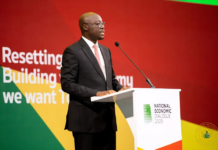
…Over decision to allow foreigners in retail business
By Cecil MENSAH
The Chief Executive Officer (CEO) of the Ghana Investment Promotion Centre (GIPC), Yoofi Grant, appears to be walking a tight rope as far as relations with the umbrella organization for retail business owners is concerned.
In the latest development of what appears to be a frosty relationship, the traders group, Ghana Union of Traders Association (GUTA), has strongly registered its displeasure about Mr. Grant’s recent comments to the effect that the protectionism offered by the GIPC Act for retail businesses in the country is to be reviewed.
Section 27 (1a) of the GIPC Act 2013 (Act 865) in possession of Business Day states: “a person who is not a citizen or an enterprise which is not wholly owned by a citizen shall not invest or participate in, the sale of goods and provision of services in a market, petty trading or hawking or selling of goods in a stall at any place.”
However, the GIPC boss has strongly stated that the centre will no longer reserve the retail sector of the economy for Ghanaians alone, Business Day Ghana has gathered.
The CEO asserted at a ceremony held recently by the Dubai Chamber of Commerce and Industry in Accra that the centre is taking steps to review the existing law, maintaining that the practice of protectionism has constrained most business owners in the sector who fear competition; thereby preventing them from growing and expanding their operations into global companies.
Protectionism valid
The rebuttal from GUTA has been fierce and uncompromising, describing the statement attributed to the CEO of GIPC as misplaced and one arising from ignorance of the processes that led to the promulgation of the GIPC Act (Act 865) of 2013, which stipulates that all foreigners need not less than one million United States Dollars to be able to invest in the purchase and sell business in the country.
Speaking exclusively with Business Day Ghana in reaction to the statement made by the GIPC boss, John Paddy, the Public Relations Officer of GUTA, said an informal complaint has been made to the Ministry of Trade and Industry (MoTI) to bring some clarity on the matter.
“When we first heard the news we were not pleased with his comment. We taught it was a misplaced comment, indicating that he had little understanding of the issues of protectionism for the retail business.”
Supporting his argument with examples from around the world, Paddy observed that “If you go through the trade tariffs of the United States of America, one will clearly see that there is a policy on commerce to protect and support the indigenes from foreigners.
“So, every country has a policy to protect its local industries. In neighbouring Nigeria, there is a policy on prohibition which offers protection for the locally manufactured goods,” the visibly worried retail chieftain said.
He related that every business needs some sort of protection. So, “I don’t understand what informed the CEO’s comments on reviewing the Act.”
Paddy, who is also the chairman of the Abossey Okai Spare Parts Dealers Association, explained that most of the time the suggestion that Ghanaians are afraid of competition is not the case because before the foreigners came into the retail business Ghanaians were competing among themselves in the sector.
Writer’s email: cecilm@businessdayghana.com



























